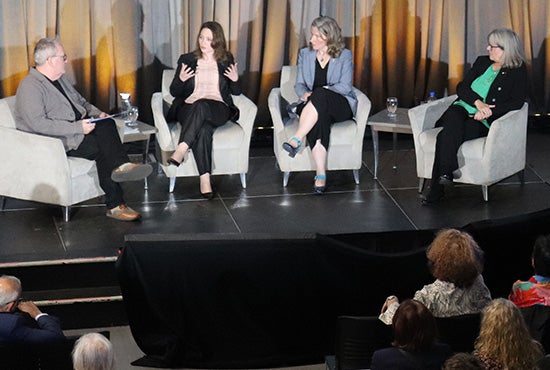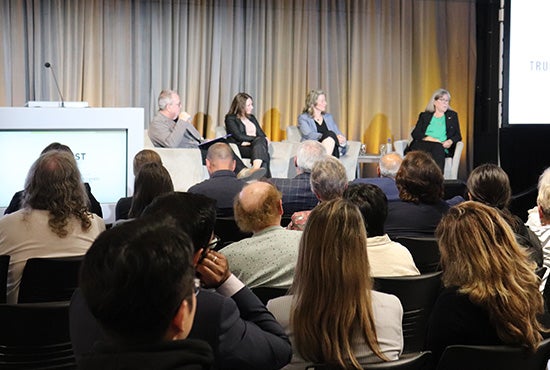
Trust in research, science and technology starts with conversations
CBC partners with Waterloo to kick off the inaugural TRuST speaker series

CBC partners with Waterloo to kick off the inaugural TRuST speaker series
By Jordan Flemming University RelationsIn the first event for the Trust in Research Undertaken in Science and Technology Scholarly Network (TRuST), Nobel laureate Donna Strickland, along with a distinguished panel of experts, delved into the various challenges researchers and practitioners across disciplines face in building trust with the public.
The evening event, Conversations on Trust in Science and Technology Lecture Series on Tuesday, September 12, centred on how as society faces crises like shifting geopolitical tensions, climate change and a strained health care system, it's vital to build public trust in research and the scientists who produce it.
Leading the event off with a public lecture on science as an economic driver and the need for better science communication, Strickland explained how the TRuST network came to be and what she hopes it will accomplish.
“I would really like the public to be aware of the impact science has on society, understanding the scientific process and the time scales of it,” Strickland said. “We must gain an understanding of the scientific review process, the extent of oversight involved, the impact of our mistakes, even if they are not published, and just how much trial and error is in science —this is why it takes time.”
“Given the complexity of scientific research, practitioners should enlist the help of other professionals to communicate their work. Journalists, playwrights, citizen scientists and other communicators are essential in the science communication process,” Strickland explained.

Donna Strickland gives her talk: TRuST in Science
Public awareness of the dynamic nature of research can be limited, leading to misunderstandings and resistance. Effective science communication is essential to bridge this gap.
Strickland emphasized that scientists should not only enhance their communication skills but also become better listeners. Understanding the disconnect between scientific recommendations and public perception can build trust and collaboration, leading to a more informed public.
Experts can offer evidence-based solutions and innovations to address the collective challenges we face. Establishing trust in their work is essential for effectively tackling these intricate challenges and charting a path toward a more sustainable and better future.

Left to right: Craig Norris, Ashley Mehlenbacher, Mary Wells and Donna Strickland
After her talk, Strickland and the panel featuring Canada Research Chair Ashley Mehlenbacher and Waterloo's Dean of Engineering, Mary Wells, with moderation by CBC's Craig Norris, touched on a range of subjects including how society understands and interacts with science, ethics and unintended consequences in research, commercialization and how rapid innovation is incentivized through public policy.
Part of promoting trust in science is having difficult conversations with individuals who might be struggling to have faith in the scientific community.
“The effectiveness of addressing this issue varies depending on factors such as your relationship with the person, their background and the specific problem at hand. However, in all cases, it's crucial to recognize that the goal isn't just to talk about the data, research or experiments but to genuinely comprehend why someone is concerned about certain issues,” Mehlenbacher stated.
“The initial step often involves engaging in an authentic conversation to understand their perspective and concerns, rather than presenting data and research articles as if they were ammunition. This approach is essential for meaningful dialogue, even though the approach may vary based on the circumstances,” Mehlenbacher continued.
Wells acknowledged that leaders in academia like herself, need to play a role and focus education on advancing trust in science.
“The focus should be on educating engineers, designers and scientists to not only create technology but also consider the ethical dimensions, intended and unintended consequences, and the impact on human interactions and lives,” she said. “The goal is to embed trust in technology by broadening the perspective of those developing it, ensuring they think beyond technical functionality.”

The panel took questions from fellow researchers, educators, students and community members
The audience had the chance to engage with the panel for an hour of question and answers with some audience members taking the opportunity to discuss key areas where science hasn’t delivered what it had promised or even produced harmful outcomes and if the pursuit of science had been worth it.
Strickland highlighted the importance of supporting diverse research interests and suggests that while some research may initially seem useless or lead nowhere, it can eventually yield valuable results. She also emphasized the role of ethics in building trust in research.
“Technologies like nuclear energy or AI can have both positive and negative applications, depending on how they are used,” she said. “But I believe that science should always be pursued — but we need to underscore the importance of ethical considerations alongside scientific advancement.”
In some cases, like during the development of the atomic bomb, scientists faced moral dilemmas about advancing knowledge and its potential societal impact. However, today's challenge lies in creating new technologies with good intentions, yet unintentionally unleashing unforeseen consequences. Social media as an example, initially designed for positive purposes, quickly scaled up and became a platform for disinformation and misinformation.
“Slowing down the rapid scaling of technologies to gain a better understanding of their implications before widespread adoption is a prudent approach, ensuring more responsible and considerate innovation,” Wells added.
In closing the event, the panel requested that the audience consider ways to get involved as the TRuST network is in its early stages of development and aims to expand its representation and engagement.
Currently the network includes members from all six faculties across campus and is adding external experts from all walks of life to help facilitate interdisciplinary discussions.
TRuST is exploring the creation of working groups involving different stakeholders, such as high school teachers, to bridge the gap between high school and university education. The goal is to encompass diverse expertise, including not only traditional disciplinary knowledge but also insights from individuals with different lived experiences and forms of knowledge.
While the current composition is predominantly research and education-focused, the network intends to broaden its scope as it evolves.
TRuST will engage the public by continuing the lecture series with the next planned for January 2024 where the conversation will focus on AI.

Read more
New optical system designed to target and control individual atoms

Read more
Canada Research Chair in Technology and Social Change is advancing artificial intelligence with more diverse human experiences

Read more
Nobel Laureate Donna Strickland is set to co-lead a new interdisciplinary network
The University of Waterloo acknowledges that much of our work takes place on the traditional territory of the Neutral, Anishinaabeg, and Haudenosaunee peoples. Our main campus is situated on the Haldimand Tract, the land granted to the Six Nations that includes six miles on each side of the Grand River. Our active work toward reconciliation takes place across our campuses through research, learning, teaching, and community building, and is co-ordinated within the Office of Indigenous Relations.